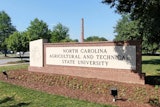New Liberian President Seeks to Rehabilitate Country’s Education System
Finding teachers still country’s main hurdle.
By Tracie Powell
Troubled by the difficulties of training teachers in Liberia, President Ellen Johnson Sirleaf says she hopes to attract them from U.S. colleges and universities.
Sirleaf envisions the Liberian Education Trust as a way to help repair a country devastated by two civil wars. The trust seeks to raise money so that the West African country can build 50 schools, train 500 teachers and offer 5,000 scholarships to students, principally girls. While efforts to restore the country’s infrastructure are well underway, Liberia still faces obstacles in finding teachers.
“Recruiting teachers remains a challenge,” Sirleaf told Diverse while on a trip to the United States. “The output from the universities has not produced enough teachers. We do have a teacher training college, but the institutions that were built specifically for this purpose were destroyed during the war.”
Liberia’s ÔIron Lady’ was in Atlanta to deliver the commencement address at Spelman College and to accept an honorary degree from the historically Black college for women.
Founded in 1822 for freed slaves, Liberia declared its independence from the United States in 1847, becoming modern Africa’s oldest republic. But the country was engulfed in civil war from 1989 to 1996, and again between 1999 and 2003. During that time, student enrollments plummeted and many schools were pillaged and destroyed. Those schools left standing were woefully overcrowded, according to media reports.
The country has not quite recovered.
Such destabilization led to nearly half of Liberia’s school-age children not attending school. Recognizing that education is the key to the country’s redevelopment efforts, Sirleaf abolished public school tuition fees and returned the tuition fees that private schools had previously paid to the government. As a result, Sirleaf says, school enrollment increased by about 40 percent, especially among girls.
Liberia’s cash-strapped central government has struggled to support the nation’s higher education institutions, pushing the financial burden onto students and their families, concludes a two-year-old report by the country’s minister of education. “The education system in Liberia has always been one of the weakest in sub-Saharan Africa, due to lack of resources, weak government commitment, poor infrastructures, and very weak economic and institutional overall context,” the report states.
The government issued the Liberian Education Master Plan, a 10-year prospectus to rehabilitate the education system. The plan has only recently been revised, Sirleaf says, and will be enhanced with efforts to attract private dollars and strategic partnerships.
Before arriving in Atlanta, Sirleaf stopped in Washington, D.C., to raise money for Liberia’s education initiative, getting help from U.S. presidential hopeful U.S. Sen. Hillary Clinton, D-N.Y. The fund-raiser brought in about $350,000, Sirleaf says, which will be used for programs associated with the Liberian Education Trust.
But finding teachers is still the country’s biggest problem. Money from the trust fund will also be used to pay teacher salaries and cover tuition costs for training, she says.
Meanwhile, she says she is talking with U.S. colleges about developing strategic partnerships to bring U.S. educators to Liberia for a teacher exchange program.
–Tracie Powell
Sirleaf on African-American Investment in Liberia:
The one advantage that African-Americans have is that we share a common culture, history, language, value and tradition. They’d hit the ground knowing many of us, knowing our institutions that are patterned after the institutions
in America.
We’ve been a little disappointed that the African-American community has not seized the opportunity and recognized the potential in Liberia — Liberia is well endowed in mineral, forestry, agricultural and marine resources. Now, we understand that we created the setback for ourselves by the many years of conflict that prevented any serious investors other than those who intended to extort. But now we’re poised to be back in business, and this is a great opportunity for African-American investors.
[Black Entertainment Television founder] Bob Johnson promised to mobilize $30 million to support Liberian businesses and has delivered. African-Americans can become the constituency for Liberia, can be our ambassadors, and can be what the Jewish community here is for the state of Israel.
* To read more of Diverse’s interview with President Sirleaf, visit http://www.diverseeducation.com/artman/publish/article_7584.shtml.
There are currently 0 comments on this story.
Click here to post a comment.
© Copyright 2005 by DiverseEducation.com















